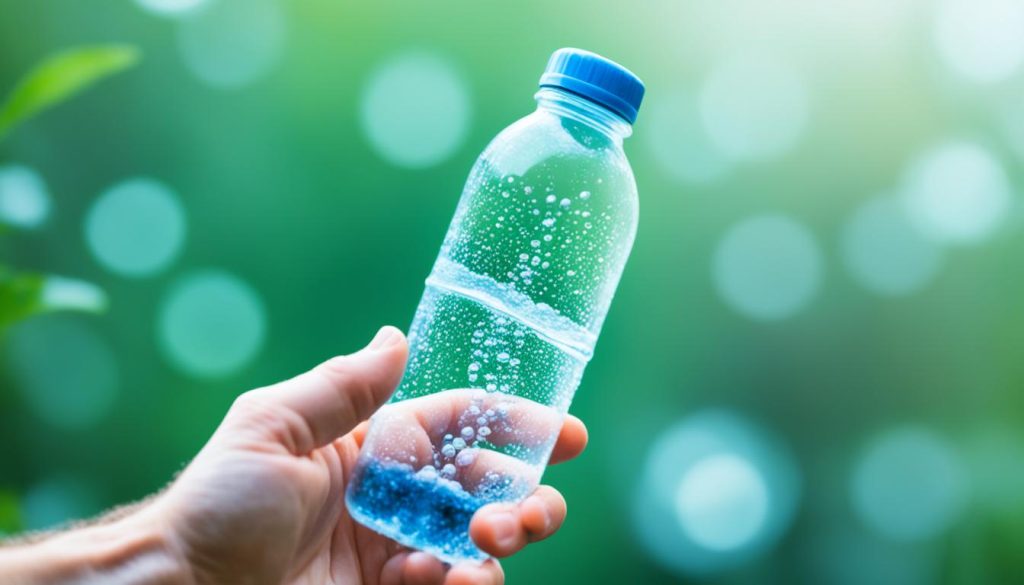Did you know a person can go for about three weeks without food, but only three days without water? It’s true. In survival settings, what you eat and drink really matters. While it’s key to find a safe water source, watching what you eat helps with hydration and nutrition too.
Being ready and looking after your body are crucial in tough times. Knowing how vital good food and drink are could save your life. So, let’s look at some important ways to keep your body fueled and hydrated in any situation.
Key Takeaways
- Proper nutrition and hydration are essential for survival in emergency situations.
- The “Survival Rule of 3s” states that humans can survive approximately three weeks without food, but only three days without water.
- Prioritize finding a safe water source and regulating your diet to ensure adequate hydration and nutrition.
- Consider methods of food and water procurement in survival situations.
- Seek out emergency nutrition assistance programs and resources when available.
Avoid Exposure and Consider Physical Condition & Exertion
When you’re in a survival situation, stopping exposure is key. It keeps you from losing too much water and suffering. This way, your physical health stays better.
Finding a shelter that breaks the wind and keeps you warm is crucial. Seek out a place that’s cool and away from the sun or cold. Doing this lowers your exposure risk and helps delay dehydration.
During the hottest or coldest points of the day, slow down. Physical work then can drain you of water fast. Save tasks for cooler times, like dawn or dusk. This tip keeps your energy up and dehydration away.
Think about your health and how hard activities are on you. It helps guess how much water you’ll need. You should know, hard work makes you lose water quicker. So, plan to drink more then.
Staying ahead of dehydration is crucial for your health. Focus on avoiding exposure and knowing what you need. This way, you’re ready to face tough spots without risking dehydration.
Regulate Your Diet and Cover Up to Retain Moisture
In a survival situation, eating right is key to stay hydrated and avoid dehydration. Think about how your diet affects your need for water. When you eat, your body uses up water to digest food. If there’s not enough water, this can make dehydration worse.
So, it’s smart to stop eating when water is scarce. This can prevent stomach pain and constipation. Both can be from not drinking enough water. By eating less, you save water and keep your hydration levels up, which is critical for staying alive.
Choosing the right clothes is also important. Light, loose clothes can help keep your skin covered. This stops moisture from leaving through evaporation. Keeping your body’s moisture in can stretch out your water supply. The clothes you wear can really help keep you hydrated in tough times.
To stay hydrated, remember to watch what you eat and what you wear for clothing. In tough spots, stop eating. And wear clothes that keep moisture in. These steps can really boost your chance of surviving.
Take Stock of Existing Water (If Any) and Look for Readily-Accessible Sources
In a survival scenario, the water you may already have is key for staying hydrated. If water is in your pack, try to avoid holding back on drinking it. Be sure to keep yourself hydrated as you search for more.
When you’re in need of water, focus on options that are easy to get to. Places like lakes, streams, and waterfalls are usually in natural spots and offer water. But, be ready to explore and know how to find your way to these water sources. Keep an eye out for signs like plants or animal tracks; they might lead you to water.
“In survival situations, every drop of water counts and being proactive in finding water sources can significantly improve your chances of survival.” – Expert Survivalist
Once you get water, make sure it’s safe to drink. Germs in the water can make you very sick. Always purify your water through methods like boiling, using chemicals, or filtration. This keeps you safe from getting ill.
Here’s a table to show you how to purify water from different places:
| Water Source | Purification Method |
|---|---|
| Lake | Boiling |
| Stream | Chemical Treatment |
| Creek | Filtration |
| Waterfall | Boiling |
Purifying water from various water sources makes it safe to drink. This is key for staying healthy and surviving in harsh conditions.
Next, we look into strategies for making every drop of water count. We will see creative ways to find water in tough situations.
Make Every Drop Count and Go Green
In a survival situation, saving water is key. You must use water wisely when it’s scarce. Find new ways to get water and change how you use it. This can help you stay hydrated in tough times.
Exploring Innovative Water Sources
- Collect water from dew, rocks, and leaves. These places have water that can save your life.
- Think about using water from plants, like moss and tree sap. In tough spots, these are good places to look for water.
It’s important to be creative with finding water. Using things like dew and plant water can keep you from getting dehydrated.
Adopting Green Survival Strategies
Being green is good for water and the planet. Try these Earth-friendly ways to save water and live:
- Be smart with water to use less of it.
- Catch rainwater to use later.
- Clean water with natural filters made of sand or charcoal.
- Don’t pollute water and use friendly cleaning stuff.
These ideas not only help save water but also keep the Earth in mind. They’re good for long-term survival.
Weigh the Risk of Questionable Water
It’s best to purify water before drinking it. But in emergencies, you might need to drink from risky sources to avoid dehydration. It’s crucial to make a careful choice. This can help reduce risk while keeping you hydrated.
In cases where you can’t purify water, using a cloth or a filter to remove big particles is useful. It makes the water better but doesn’t get rid of everything harmful. This means there are still dangers to watch out for.
If you must drink questionable water, watch for any ill effects. If you start feeling unwell, get medical help fast. This could mean you’ve taken in harmful pathogens.
Drinking from dangerous water sources should only happen in the worst dehydration cases. Always aim to purify water and find safer sources. This is the better choice in tough times.
Conclusion
In emergency situations, it’s vital to focus on getting the right food and drink for survival. Eating well and staying hydrated can help you stay healthy and recover faster. For instance, not being well-fed when entering the ICU can lead to more deaths in surgery patients. So, getting the right nutrition is key. This is according to a study in 2018 by the Journal of Parenteral and Enteral Nutrition.
Adding food through a tube in the small intestine and feeding through veins can really help sick folks. These methods have been shown to make things better and to lower the chances of things going wrong in very sick people. Studies in 2015 and 2014 found this to be true. You can check them out in the Asia Pacific Journal of Clinical Nutrition and Critical Care Medicine.
Eating the right food and drinking enough water is super important after surgery. It can make a big difference in how many problems you face after surgery. People with stomach cancer and those needing sudden belly surgeries do better with the right meals. A study in 2007 and more recent ones in 2013 and 2014 show this. Check these out at Clinical Nutrition, World Journal of Surgery and Medicine.
Using tubes to give food and drinks around surgery time is also really helpful. It can lead to better results for patients. Nutrients from food and drink given this way can really help. This is based on studies in 2013 and a few years back. You can read more at Nutrients, Therapeutische Umschau, and Endocrinología Y Nutrición.
So, being ready for emergencies involves not just having enough food and water. It’s also about knowing how to eat and drink to stay alive. Many studies point out how important nutrition is in sickness and after surgery. They underline the need for the right food and drinks. This info comes from articles in 2015, 2014, and even older ones. You can find more at The Lancet Diabetes & Endocrinology, Nutrition, and Transplantation Proceedings.
By thinking about the meals and drinks we need, we can better face emergencies. Keeping our nutrition and hydration in check can help us survive and feel better overall.


